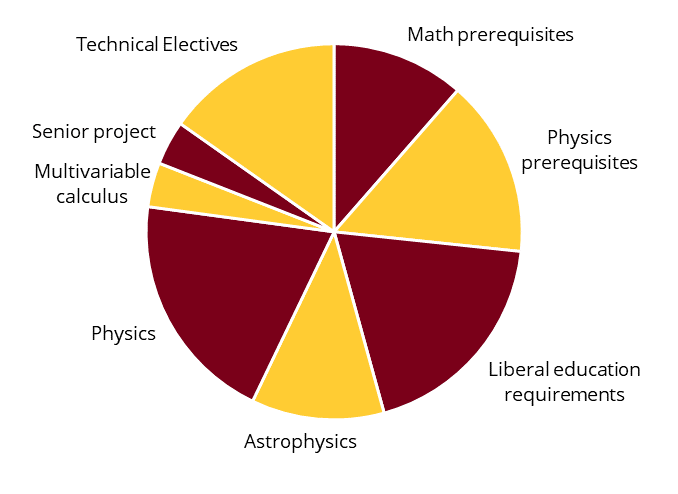Astrophysics Degree Requirements

The astrophysics program enables students to tackle complex and ill-defined problems within the physical sciences. The program prepares students for careers in professional astronomy, computational astrophysics, secondary education in the physical sciences, ROTC programs in the Air Force or Navy, data analysis, or laboratory science.
There is one basic degree program in Astrophysics in the College of Science and Engineering, featuring two sub-plans: Professional Emphasis and Secondary Education. Regardless of their desired career path, all students will benefit from additional course work specific to that path. All Astrophysics majors must meet the University wide Liberal Arts requirements by graduation. CSE also has a writing intensive requirement.
Astrophysics majors have the option of graduating with Latin honors. For more information see the University Honors Program website.
This page details the requirements for the Bachelor of Science in Astrophysics, taken through the College of Science and Engineering. The requirements for the Bachelor of Arts in Astrophysics, taken through the College of Liberal Arts, are similar, but include the college-wide liberal arts requirements of the CLA and consist of slightly fewer credits within the major. See the University Catalog Entry for more information.
Undergraduate Advising Contact
Robert Gehrz
gehrz001@umn.edu
612-624-7806
University Catalog—Astrophysics B.S.Astrop.
Program Overview

| Admission Prerequisites | |
|---|---|
| General Requirements | |
| Program Requirements | |
| Mathematics Core | 12 credits |
| Physics Core | 16 credits |
| Total varies | |
| Astrophysics | 12 credits |
| Physics | 21 credits |
| Multivariable Calculus | 4 credits |
| Senior Project | 2–5 credits |
| Technical Electives | 16 credits |
| Total credits in major | 83–86 credits |
Admission Prerequisites
Students must complete 7 courses before admission to the program.
Mathematics Core
The mathematics core consists of 3 course requirements:
- Calculus I
- Calculus II
- Linear Algebra and Differential Equations
Each of these requirements may be fulfilled by one of three courses. See the University Catalog for more detailed information.
Physics Core
The physics core consists of 4 course requirements:
- Physics I
- Physics II
- Physics III
- PHYS 2201 Introductory Thermodynamics and Statistical Physics
The first three requirements may be fulfilled by one of three courses. See the University Catalog for more detailed information.
General Requirements
All students in baccalaureate degree programs are required to complete general University and college requirements, including writing and liberal education courses.
View Liberal Education Requirements
Astrophysics Program Requirements
Core Requirements
Astrophysics
The core astrophysics component of the degree consists of 3 requirements:
- AST 2001 Introduction to Astrophysics
- Two AST 4xxx–5xxx courses.
See the University Catalog for information on which courses complete this requirement.
Physics
The physics component of the degree consists of 5 courses:
- PHYS 2601 Quantum Physics
- PHYS 3041 Mathematical Methods for Physicists
- PHYS 3605W Modern Physics Laboratory
- PHYS 4001 Analytical Mechanics
- PHYS 4002 Electricity and Magnetism
Multivariable Calculus
- Multivariable Calculus
This requirement may be fulfilled by one of three courses. See the University Catalog for information on which courses complete this requirement.
Note: Each credit hour of directed research requires at least 45 hours of mentored work over the course of the semester (so a 2 credit course will require 90 hours of work in the semester).
Astrophysics Program Sub-plans
Students are required to complete one of the following sub-plans.
Professional Emphasis
This sub-plan is designed to suit the needs of those planning to apply astrophysics in the workplace or continue their education in graduate school.
- PHYS 4303 Electrodynamics and Waves
- Senior Project
The Senior Project requirement can be met either with AST 4994W Directed Research, also known as the Capstone, or the Senior Thesis project. Reach out to a MIfA faculty member to serve as your advisor. You and your faculty advisor will choose a research topic together. Your advisor will review and comment on a draft of your report before you submit the final report.
Secondary Education
This sub-plan is designed for students who are interested in teaching science at the secondary-school level. It is particularly useful to students who are planning on teaching in Minnesota, as it has been optimized to fit well with the state licensure procedures.
- PSY 1001 Introduction to Psychology
- Philosophical Foundations
- Historical and Social Perspectives of Science
Methods of Experimental Physics
- PHYS 4051 Methods of Experimental Physics I
- PHYS 4052W Methods of Experimental Physics II
The Philosophical Foundations and Historical and Social Perspectives of Science requirements can both be fulfilled by one of multiple courses. See the University Catalog for more detailed information.
Technical Electives
The astrophysics degree requires 16 credits of technical electives for those in the Professional Emphasis sub-plan, and 5 credits for those in Secondary Education. Technical electives for the astrophysics degree are available in various departments. Your choice of electives may vary depending on your desired career path or specialization. Be sure to discuss your career interests with your advisor to help decide what electives will be most relevant for you. The University Catalog entry gives a full listing of available electives.
University Catalog—Astrophysics B.S.Astrop.
University Catalog—Astrophysics B.A.